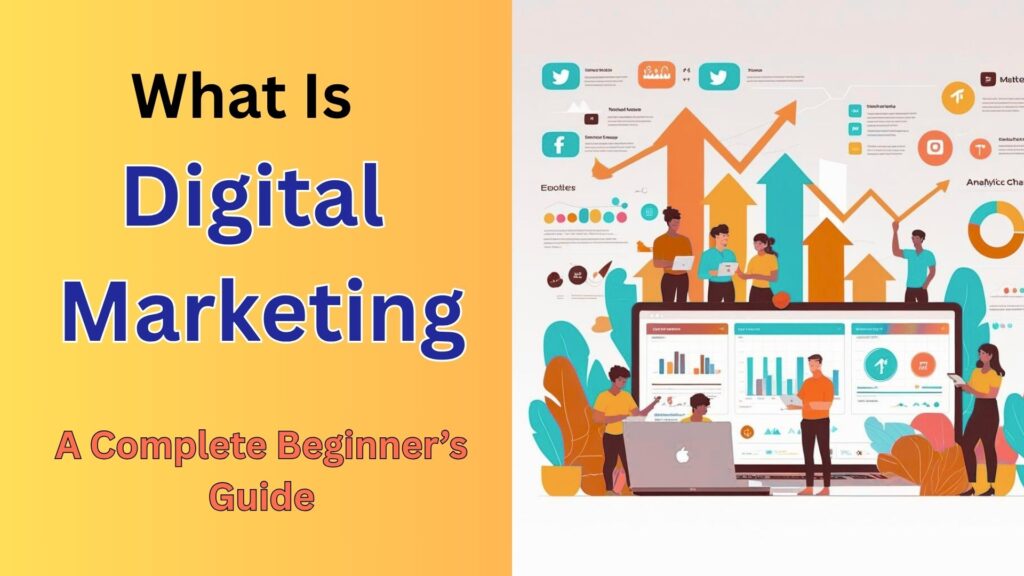In today’s connected world, the way businesses reach and engage with their customers has changed. No longer are brands limited to billboards, flyers, or TV ads. With the rise of the internet and digital technology, marketing has become a more dynamic, measurable, and interactive discipline called digital marketing. If you’re just starting or want to know how it can help your business or career, this guide will introduce you to the basics of digital marketing.
What is Digital Marketing
At its core, digital marketing refers to all forms of marketing that use digital channels to promote products or services to consumers. These channels can include websites, search engines, social media, email, mobile apps and even online video. Unlike traditional marketing, which uses offline methods like print or broadcast media, digital marketing is powered by the internet and digital technology, making it more accessible and data-driven.
Why Is Digital Marketing Important?
In today’s business world, people spend a big chunk of their day online. If searching on Google, scrolling Instagram or watching YouTube, today’s potential customers are more likely to encounter brands in digital spaces than anywhere else. Here are several reasons why digital marketing is essential:
- Global Reach: With the internet, even small businesses can reach customers around the world.
- Cost-Effectiveness: Digital campaigns can often be more affordable than traditional methods, offering excellent ROI.
- Measurable Results: You can track every click, view, and sale, allowing for continuous optimization.
- Targeted Outreach: Digital tools enable precise targeting based on interests, demographics, behaviors, and location.
- Interaction and Engagement: Businesses can directly interact with their audience, fostering loyalty and trust.
Key Components of Digital Marketing
- Search Engine Optimization (SEO): SEO involves keyword research, on-page optimisation (content, headings, meta-tags), off-page efforts (backlinks), and technical improvements (site speed, mobile usability).
- Content Marketing: Content marketing is about creating and sharing valuable, relevant and consistent content to attract and engage a clearly defined audience. This could be blog posts, articles, infographics, videos, ebooks and podcasts. The goal is to be seen as a trusted authority in your industry.
- Social Media Marketing: Social media platforms like Facebook, Instagram, Twitter, and LinkedIn are powerful tools to engage with customers, share content and build communities. Each platform requires a different approach depending on the audience and features.
- Pay-Per-Click (PPC) Advertising: PPC allows marketers to place ads on search engines and other platforms and pay a fee every time someone clicks their ad. Popular platforms include Google Ads and social networks like Facebook Ads. PPC campaigns can drive traffic quickly and are great for promotions and product launches.
- Email Marketing: Despite the rise of new communication channels, email is still a highly effective marketing tool. By building and segmenting an email list, businesses can nurture leads, communicate news, promote offers and build strong customer relationships.
- Affiliate Marketing: Affiliate marketing is where businesses partner with individuals or other companies (affiliates) who promote their products in exchange for commissions on sales or leads generated through their efforts.
- Influencer Marketing: Brands collaborate with social media influencers, people with large online followings, to promote their products in more authentic and trusted ways.
- Mobile Marketing: As people are accessing the internet more and more through their mobile devices, adapting marketing strategies for mobile is essential. This includes responsive websites, mobile apps, SMS campaigns and location-based offers.
- Analytics and Data: At the heart of digital marketing is analytics. Tools like Google Analytics, Facebook Insights or built-in platform dashboards help marketers measure performance, understand user behaviour, and refine strategies for maximum impact.
How to Get Started with Digital Marketing
- Set Clear Goals: What do you want to achieve, more website traffic, leads, sales or brand awareness? Your goals will guide your strategy and tactics.
- Understand Your Audience: Research your target audience, what are their needs, interests and online behaviour? Create buyer personas to guide your content and messaging.
- Build an Online Presence: Start with a user-friendly website optimised for desktop and mobile. Set up social media profiles relevant to your audience and business goals.
- Develop a Content Strategy: Plan out the types of content you will create and how often you will publish. Make sure your content adds value and answers your audience’s questions and pain points.
- Utilize SEO Best Practices: Put relevant keywords in your web pages and blog posts. Focus on creating high-quality, original content and getting backlinks from other reputable sites.
- Use Paid Advertising: Test PPC or social media ads to get more reach. Set clear budgets, define the target audience and monitor campaign performance regularly.
- Track and Analyze: Use analytics tools to see what works and what doesn’t.
Tips for Digital Marketing Success
- Stay Updated: Digital marketing trends and algorithms change daily. Subscribe to industry blogs, attend webinars, and take free online courses to keep your skills up to date.
- Be Authentic: Audiences love honesty and transparency. Build trust through real interactions and great content.
- Test and Learn: Don’t be afraid to try different formats, platforms and messages. Small tests can lead to big wins.
- Prioritize Mobile: Make sure your website, emails and ads work on mobile.
- Engage: Reply to comments, messages, and reviews, and you’ll build loyalty and get valuable feedback.
Conclution
Digital marketing is not just a trend. It’s an essential component of success in the modern business landscape. With its wide array of channels and tools, marketers of any experience level can reach targeted audiences, measure impact, and adapt on the fly. By understanding the basics and focusing on continuous learning, you can harness the power of digital marketing to grow your business or propel your career forward.

